
on
*sdílené články jsou řazeny od těch podle mě nejlepších po dobré

on

on www.youtube.com
Most of us tend to believe that luck is this omnipotent force beyond our control, but the reality is we can actually manufacture luck and increase our chances of lucky events happening to us. Psychology Professor Richard Wiseman has published over 100 academic papers and countless books examining the psychology of magic, illusion, deception, luck, and self-development. Discussing the findings of Richard’s ten-year scientific study into the nature of luck, the power of the ‘As If’ principle, magic and much more.

on hbr.org
Connection in the workplace is commonly thought of as a single dimension that prioritizes interpersonal relationships with co-workers. However, in a recent research collaboration, the research team at the NeuroLeadership Institute (NLI), along with technology firm Akamai, identified that connection in the workplace is, in fact, made up of four interrelated and essential elements: employee connections with their colleagues, leader, employer, and role. This more accurate and nuanced view of workplace connections has implications for how organizations can design intentional talent strategies to create workplaces where employees are committed, engaged, and performing.
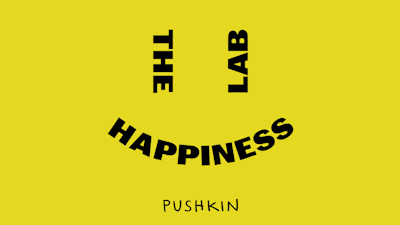
on open.spotify.com
The biggest names in wellness podcasting, “The Titans of Happiness,” come together to discuss the greatest mental health challenges facing us in 2024 and the simple things we can all do to be happier.

on hbr.org
Numerous studies show that close to two-thirds of U.S. employees are bored, detached, or jaded and ready to sabotage plans, projects, and other people. Why so much unhappiness among professionals who have the capacity to shape their work lives? The author highlights three of the most common reasons—ambition, doing what’s expected of us, and overwork—which seem productive on the surface but are harmful when taken to the extreme. To break free of these “happiness traps,” you first have to accept that you deserve happiness at work.
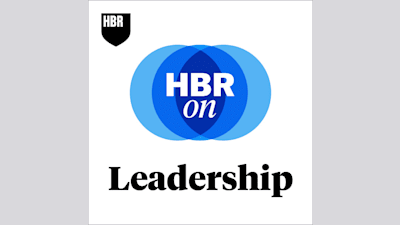
on open.spotify.com
In this episode, Ellen Van Oosten answers questions from listeners who are struggling to move into management. She advises what to do when you’ve been tapped for a managerial role but don’t want the job. She also discusses how to respond if your supervisor is blocking you from earning a promotion into management and how you can move to manager even if you only have informal management experience.

on hbr.org
Research has long shown the importance of self-care — yet many leaders still struggle to put self-care into practice in their own work lives. Before a leader can sustainably practice self-care, several important mindset shifts are necessary to ensure leaders set themselves up for success. This five-part checklist can help leaders make self-care a reality. Leaders are encouraged to personalize their plans and practice regularly for optimal health and effectiveness as leaders.

on open.spotify.com
Psychologist Jamil Zaki studies the science of human connection, and he believes cynicism is holding us back. He says cynicism is harmful to our health and misguided. He talks to Maya about a powerful, alternative mindset that can help: what he calls “hopeful scepticism.”

on open.spotify.com
Managing is a tough job, sometimes a seemingly thankless one where you can feel squeezed from all sides. But for team leaders who are feeling burnt out or overwhelmed with their jobs, Daisy Auger-Domínguez has advice on regaining your joy at work. She recommends various techniques to incorporate optimism and well-being into your management role.
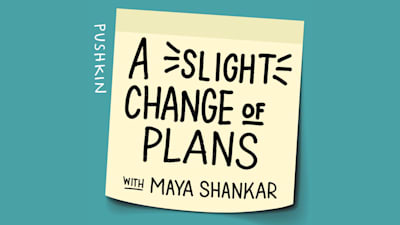
on open.spotify.com
On The Happiness Lab, Laurie shares evidence-based research that will challenge your understanding of the means to live a happy life. Based on the popular psychology course she teaches at Yale, you’ll hear inspiring, surprising stories that will make you think differently about your own happiness.

on www.forendors.cz
Epizoda Psychobitches, která je o emocích. Vážně, nevážně. Based on science and practice. Doporučuju, za těch pár korun slyšet ji celou se vyplatí!
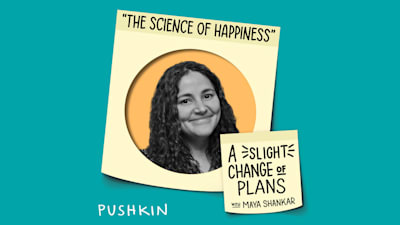
on open.spotify.com
We're not great at knowing what makes us happy, says Laurie Santos, host of “The Happiness Lab.” Laurie joins Maya for a wide-ranging conversation about the latest happiness research and her favourite happiness-boosting strategies. They also discuss how much of our happiness is hard-wired, if there's such a thing as thinking about happiness too much, and what you should know if you ever feel guilty feeling happy, given the state of the world.
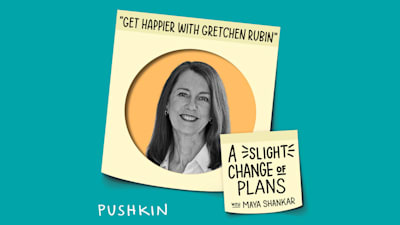
on open.spotify.com
Gretchen Rubin is an author and podcaster who is passionate about helping people become happier. One of the biggest lessons she's learned in her decades-long study of the subject is that there is no one-size-fits-all hack for finding happiness. Gretchen talks with Maya about how important it is to tailor our approach based on what she calls the “four tendencies,” or personality types.

on www.amazon.de
In this game-changing guide, decision-making expert Annie Duke shows why quitting what holds you back is essential for success. Drawing on new research and fascinating examples, this book offers practical strategies and explains: - Why it's so hard to walk away - How to identify when it's best to persevere or pivot - How quitting on time often feels like quitting too early

on www.amazon.de
From unlimited holidays to abolishing approvals, Netflix offers a fundamentally different way to run any organisation, far more in tune with an ever-changing, fast-paced world. For anyone interested in creativity, productivity, and innovation, Netflix's culture is close to being a holy grail. This book will make it and its creator fully accessible for the first time.

on www.amazon.de
Everybody knows that hard work, luck, and talent each play a role in our working lives. In his landmark book, Adam Grant illuminates the importance of a fourth, increasingly critical factor—that the best way to get to the top is to focus on bringing others with you. Give and Take changes our fundamental understanding of why we succeed, offering a new model for our relationships with colleagues, clients, and competitors.
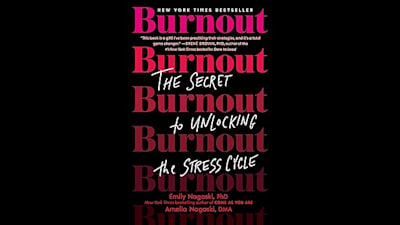
on www.amazon.de
Burnout—many women in America have experienced it. What’s expected of women and what it’s like to be a woman today are two very different things, and women exhaust themselves trying to close the gap between them. The authors are here to help end the cycle of feeling overwhelmed and exhausted. Instead of asking us to ignore the very real obstacles and societal pressures that stand between women and well-being, they explain with compassion and optimism what we’re up against and show us how to fight back.

on www.amazon.de
In The Art of Gathering, Priya Parker shows us how to ensure that every meeting is a truly transformative experience. An expert on organizing successful gatherings, whether in conference centres, crisis zones, or her living room, Parker outlines a human-centred approach to gathering that can help us create meaningful, memorable moments—large and small, for work and play.

on www.amazon.de
This book reveals the core techniques readers need to unleash their inner genius. It is organized into four sections: Mindset, Motivation, Meta-Learning, and Mission. Readers will discover the myths they've been told about their IQ, abilities, and skillset, understand why learning matters, learn core habits and steps to becoming limitless, and explore how they can serve the world.

on www.amazon.de
Intelligence is usually defined as the ability to think and learn, but in a rapidly changing world, another set of cognitive skills might matter more: the ability to rethink and unlearn. our beliefs get brittle long before our bones. We think too much like preachers defending our sacred beliefs, prosecutors proving the other side wrong, and politicians campaigning for approval–and too little like scientists searching for truth. Intelligence is no cure, and it can even be a curse: being good at thinking can make us worse at rethinking. The brighter we are, the blinder to our own limitations we can become.

on www.amazon.de
Hidden Potential offers a new framework for raising aspirations and exceeding expectations. Adam Grant weaves together groundbreaking evidence, surprising insights, and vivid storytelling that takes us from the classroom to the boardroom, the playground to the Olympics, and underground to outer space. He shows that progress depends less on how hard you work than how well you learn.
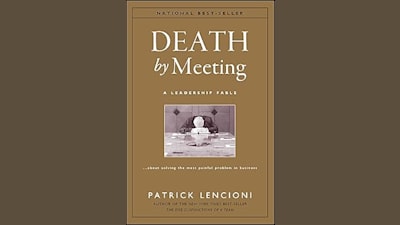
on www.amazon.de
In his latest page-turning work of business fiction, best-selling author Patrick Lencioni provides readers with another powerful and thought-provoking book. This one centred around a cure for the most painful yet underestimated problem of modern business: bad meetings. And what he suggests is both simple and revolutionary.
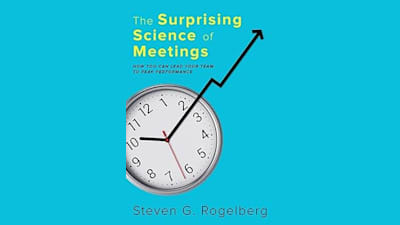
on www.amazon.de
A recent estimate suggests that employees endure a staggering 55 million meetings a day in the United States. This tremendous time investment yields only modest returns. No organization made up of human beings is immune from the all-too-common meeting gripes: those that fail to engage, those that inadvertently encourage participants to tune out, and those that blatantly disregard participants' time.

on hbr.org
The new work calendar isn’t about office or home, it’s about three meeting types and the conditions that serve them best. Transactional gatherings move work forward; relational gatherings strengthen connections; and adaptive gatherings help us address complex or sensitive topics. The author outlines the best conditions for all three and explains why each needs to have its own space and place.

on hbr.org
Agendas are an important first step in a successful meeting, but far too few leaders give them enough thought. In fact, research has found that a large percentage of agendas are simply recycled from meeting to meeting. So, what can you do to create agendas that inspire, target the issues that need to be resolved, and leave attendees satisfied with the time spent discussing them together?
Přihlásit se k odběru nově přidaných inspirativních tipů pomocí RSS
Vedete technologický tým, máte na starosti marketing či HR v tech firmě a rádi byste se (nebo nejen sebe) rozvíjeli, ale nevíte, kde začít? Máte pocit, že se potřebujete ponořit do dalších témat a jen zajít na nejbližší akce či meet-up nemusí být dost?
Vyplněním e‑mailu se přihlašujete k obsahovému newsletteru tvůrce a souhlasíte s obchodními podmínkami.
